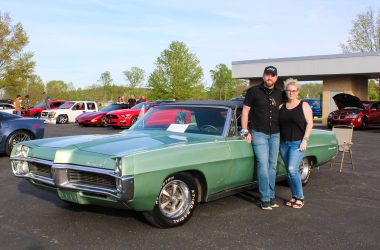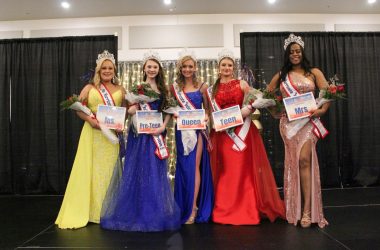By Gregory Hayes, North Chesterfield, VA
I was pleased to read the article entitled, “Opening of the Creamery Makes for a Happy Day in Hurricane,” published in the February 1 issue. The new business in the Grant Building looks enticing, and I plan to visit it soon. I was surprised when the article mentioned that it is located in the former home of Rooper’s Dry Goods, a business conducted from 1950-1967 by my grandparents. Since more than a half-century has passed since what my family called “The Store” graced Main Street, I thought some background may interest some readers of The Breeze.
Nye and Alice Rooper (my Papa and Mama) were long-time residents of Hurricane, having moved there in the late 1930’s after he became the station operator at the train depot. A native of Teays Valley, he served as Town Recorder for several years and was also a United Baptist evangelist. In the late 1940’s, foreseeing the major upheaval coming to the nation’s railroad system, he began considering a career change. Continuing to work at the depot, he and Mama operated a truck stop on Rt. 60 near the location of the current Dairy Queen. Working full-time at the depot, part-time at the truck stop, and conducting revivals for weeks at a time turned out to be too much even for his considerable energies. As my mother, Ladena Rooper Hayes, once declared, “It nearly killed us all!”
Shortly after selling their interest in the truck stop, they borrowed $5000 from his father, George Washington Rooper, to open Rooper’s Dry Goods. Originally located at 2803 Main Street (currently Sergio’s), the business relocated a year later to the corner of Main Street and Dudding previously occupied by a grocery store. The loan was repaid in six months.
The store featured high-quality, though not always “name brand,” goods. Washington DC dress shirts, for example, looked and wore as well as a “name” shirt, yet cost significantly less. An innovative pricing philosophy also enabled the store to compete with larger department stores in Huntington and Charleston. Since the store was operated by family members and one or two clerks, wholesale prices could be marked up by 33% for retail sale instead of the standard 50%. Although the store could not offer the sheer number of choices people expect today, lower prices and quality goods made it a successful business for its time.
That didn’t mean there were no missteps along the way. After the Democratic landslide of 1964, Papa purchased a dozen hats of a style favored by President Lyndon Johnson. The hats came with a professional window display featuring the US Capitol building. Unfortunately, they were not popular with the patrons of Rooper’s Dry Goods. I think one hat was sold in three years. I have long wondered what happened to the rest!
My grandparents owned and operated Rooper’s Dry Goods for seventeen years. On lazy summer afternoons, I would be given a quarter to buy comics from Doc Raines’ pharmacy down the street. I would devour them while lying on the table where fabrics were measured. During my boyhood, I learned the basics of bookkeeping, figuring sales tax, measuring shoe sizes, and operating a cash register. After a full day’s work from 8 a.m. to 6 p.m., Papa would close the store, eat supper with Mama, and do bookkeeping in the evening. The day’s proceeds were usually hidden in a shoe until the bank opened the next day.



